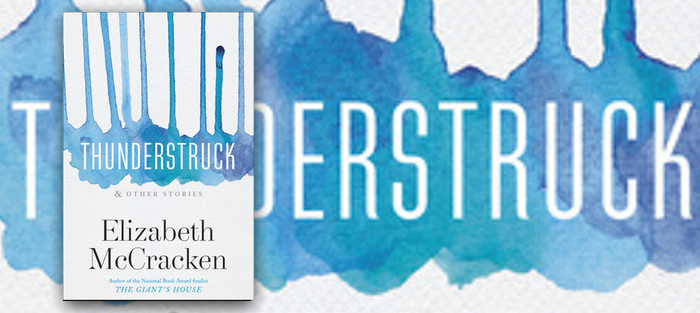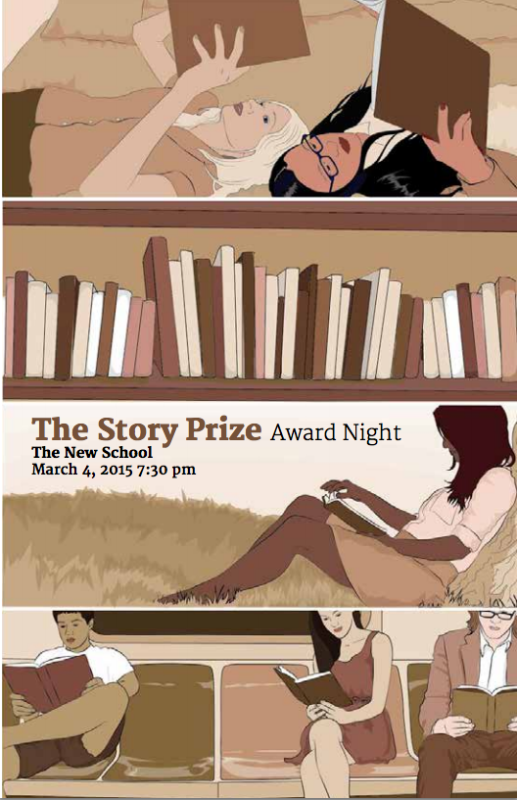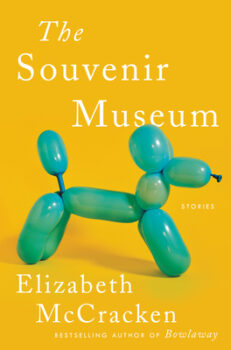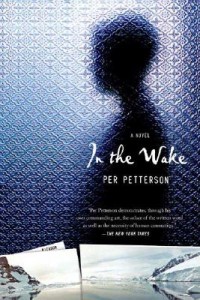On Wednesday night, The Story Prize awarded its $20,000 prize to Elizabeth McCracken, for her short story collection Thunderstruck (Dial Press). The event took place at the New School in New York City. Also nominated were Lorrie Moore for Bark (Knop) and Francesca Marciano for The Other Language (Pantheon). Now in its 11th year, there were a record 129 submitted collections, and the three finalists were judged by Arsen Kashkashian, book buyer and general manager of the Boulder Book Store, in Boulder, Colorado; Noreen Tomassi, Director of The Center for Fiction, in New York; and short story writer and novelist Laura van den Berg.
In his introductory remarks, Luis Jaramillo, Director of the graduate writing program at the New School, said, “If the poem and the novel ran off together and had a brilliant but non-conformist child, that would be the short story. Those of us here know the short story deserves all the attention it can get.” The evented was hosted by Story Prize Director Larry Dark, who interviewed each of the finalists onstage following a reading from their books. Here are some highlights from the evening:
Elizabeth McCracken
Dark asked about the theme of painful loss, which runs through this collection, and McCracken described the real comfort humor brings in times of sorrow:
I can’t say I have any kind of religious belief, but to the extent to which I believe there is redemption in the world of sadness, that is found in black humor. In the worst moments of my life, that’s a deep comfort to me, a sincere comfort, not a putting off feeling things but part of the sadness.
When asked about the sensuality of her prose, McCracken explained:
What I’m always looking for, whether I’m reading very realistic or extremely unrealistic fiction, is evidence that the world of the story or the novel exists. So when I’m writing, I want to put in evidence that this is a real world with all of the sensory details.
She also gave us three hilarious analogies that compared the act of writing short stories to novels. The first one she borrowed from a friend: “If short stories are a love affair, then novels are a long marriage.” But in her words: “If short stories are a blow to the solar plexus, then novels are a long lingering illness.” She also compared short stories to dioramas and novels to historical reenactments:
In a diorama, to have a world that makes sense to the viewer, you have to do ridiculous things. Cut a moose in half and have one white duck and a painting of a duck. I love that sometimes, but even the most realistic short story is not realistic in that way. In the novel, you get to use the whole moose. All the ducks.
When she received her award, in addition to her agent, editor, and family, McCracken thanked independent booksellers and editors of literary magazines. (Woot!)
Lorrie Moore
Moore discussed the political undercurrents running through her stories—in this collection, the war in Afghanistan, 9/11, the election of Barack Obama (and, she added wryly, the death of Michael Jackson). “I didn’t want to artificially make things up, I wanted [these political occurrings] to be in the character’s lives in the natural way that they’re in our lives.”
When asked about her careful crafting of sentences, Moore replied:
You know right after college I had a job as a paralegal, and it was before computers, and I had to suck all the extraneous language out of the depositions. So I became quite allergic to extra language, and I really started to talk like Tonto, ‘Me go store.’ I took all the articles out. Then, in graduate school, I was very careful about what I put back in. I’m still slowly putting back in adverbs. I’m not afraid of adverbs anymore.
Moore admitted that when she’s at her desk, writing a joke, she occasionally finds herself laughing. But, she was quick to add, “I laugh in a dry, dry way.”
Francesca Marciano
A native Italian, Marciano recalled the Derek Walcott epigraph that opens her collection: “To change your language, you must change your life.” Also a writer of Italian screenplays, her novels and story collections are solely in English. She described New York fondly as a place she lived in her twenties, “where she became an adult.”
In her collection, Dark pointed out that there was a restless theme that runs through the stories, and Marciano explained:
All the characters in the book are in a place that is not their own, faced with cultures they don’t fully understand. They are in that state of vulnerability, the state we are in when we visit a country we’re not familiar with. We are scared but at the same time we’re very open. So all the characters are on the verge of some type of transformation or change, of crisis, in the Greek sense of the word, of change and transformation… I wasn’t aware that all of the stories are essentially all about one thing, but I think writers do have a theme that they write about over and over again in different forms. I like that. I think it’s actually quite wonderful that one can pursue an obsession and mask it in different stories, but it’s always the same.







